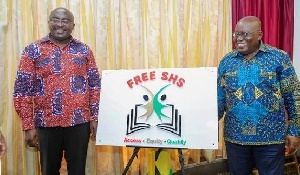 The free SHS policy has faced many challenges since its implementation
The free SHS policy has faced many challenges since its implementation
Public Relations Officer for the Ministry of Education, Kwasi Kwarteng, has opined that a call for the review of the Free SHS policy will be misplaced if not put in the proper context of our educational system.
He maintained that prior to the implementation of the Free SHS policy, the educational system was facing some challenges. Hence, it will be unfair to attribute those challenges to the implementation of the Free SHS.
“A conversation about reviewing Free SHS should be put in a very proper context so that we know what needs to be reviewed. The whole idea about free SHS is just predicated on the fact that this time around, students are not paying for the education that initially they had,” he expressed on the Happy Morning Show hosted by Samuel Eshun.
“Every policy has an implementational challenge. Of course, if it is about the whole educational system that needs review, that is fine but if anybody calls for a review of the free SHS policy, my understanding is that the policy is predicated on the fact that government is taking the cost where ordinarily parents would have borne that cost. And so, we will have to put in a proper context to be able to know and streamline the conversation”, he stressed.
The comments by Kwasi Kwarteng come on the back of calls by various stakeholders in the education sector to review the Free SHS policy as they have identified some challenges that have come along with the implementation of the project.
Earlier this year, for example, the National Association of Graduate Teachers (NAGRAT)called for a national stakeholder engagement to analyze and review the Free Senior High School (SHS) policy.
Among the challenges it cited were feeding fees, the supply from the buffer stock, and the bill that catered for the day-to-day running of SHSs across the country.
The FSHS policy introduced in 2018 is geared towards absorbing cost of secondary school education for qualified students who gain admission to public schools.
The policy prescribes the absorption of costs of examination, entertainment, library, Students Representative Council (SRC) dues, sports, culture, science and mathematics quiz, information communication technology (ICT) and co-curricular fees for day-students in public SHSs. Subsequently, the cost absorption has been extended to boarding house students and covers feeding, accommodation and provision of some basic textbooks recommended for study.